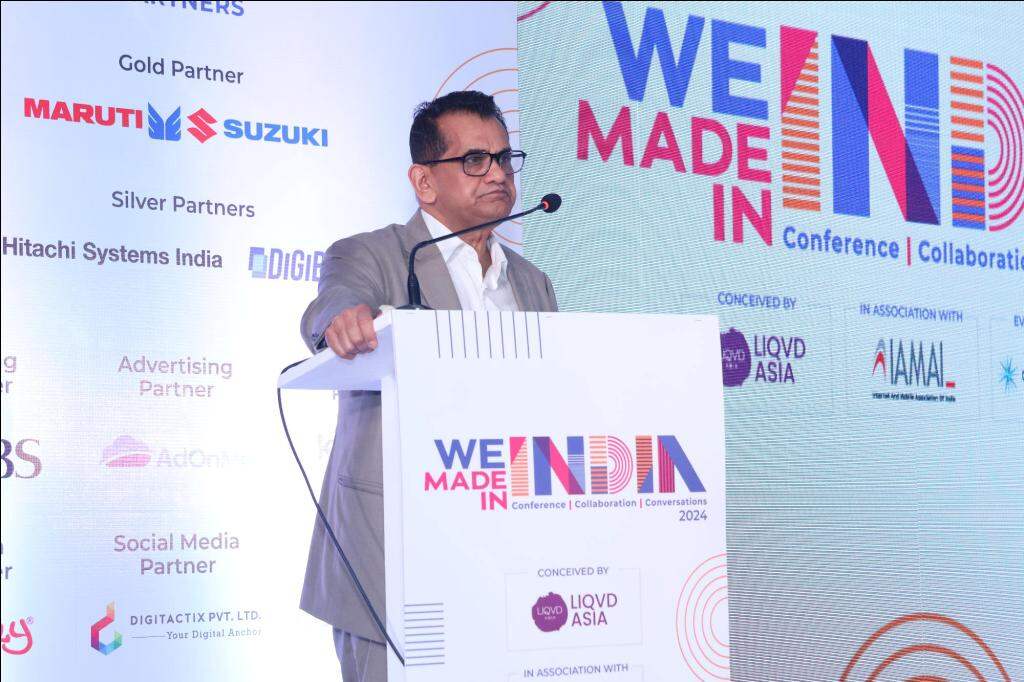Mumbai, India: The simplification of regulations and the focus on ease of doing business have created a conducive environment for entrepreneurship to thrive, leading to remarkable improvements in India’s rankings in world business, Amitabh Kant, former CEO of Niti Aayog and an esteemed G20 ‘Sherpa’ of India during her Presidency year said during his keynote address at the first chapter of the “We Made in India – 2024’ series at JW Marriott Mumbai Sahar on Thursday, April 18, 2004. The event was organized by Liqvd Asia and Demostar, in association with the Internet and Mobile Association of India (IAMAI).
“The digital revolution sweeping across India has brought about profound changes, with initiatives like Aadhaar-linked bank accounts facilitating fast and secure transactions on an unprecedented scale. India saw 500 million bank accounts linked to Aadhar and mobile numbers, enabling rapid payments. Today, 135 billion transactions occur annually, with 46% being real-time. Surpassing China, India leads in automatic debit and credit, streamlining transactions without the need for wallets. This shift signifies a remarkable leapfrogging in technology, empowering every individual with a digital identity and facilitating seamless financial interactions,” Amitabh Kant added.
Kant, who was the keynote speaker at the event also spoke on Start-Ups and the penetration of Apps. “The proliferation of startups leveraging technology for financial inclusion, stock market access, and insurance penetration is reshaping India’s economic landscape, especially in rural areas. Apps like Zeroda and Upstock democratize stock trading in Tier 1 and 2 cities. Rural India embraces wealth creation via mobile stock market transactions. There are Apps that have revolutionized insurance access in Tier 2 and 3 cities, reducing processing time to just 1 minute. India’s transaction costs plummeted from US$ 50 to less than a dollar due to mobile-based operations, reducing paperwork and identity establishment expenses, and fostering widespread accessibility and affordability in financial transactions,” he said.
Kant also held a separate meeting with several founders and co-founders present at the event. Playing the usual role of a problem-solver for Indian start-ups, he took note of the challenges they faced pertaining to enhancing the ease of doing business and promised to resolve the issues raised by the industry captains in a time-bound manner.
India has embarked on her ‘Make in India, Make for World’ mission and results have already started emerging. According to the 2022-23 export data, Indian exports stood at US$ 762 billion. Of this, US$ 453 billion came from manufactured goods. ‘We Made in India – 2024’ aims to harness the spirit of resilience and innovation that defines the great Indian DNA, fostering a platform for ambitious entrepreneurs and enterprises to exchange knowledge, inspire critical thinking and unlock potential.
‘We Made in India’ will finally emerge into a progressive, multi-city intellectual property, championing the new age of India.
“India’s consumer-driven economy makes it the only recession-proof country in the world. The country’s projected trajectory to a $7 trillion economy by 2030 underscores its potential as a powerhouse of economic growth. Apple reports one-third product of its global sales are manufactured in Foxconn’s Chennai factory. Volkswagen exports roughly 2 million cars worldwide. Oracle employs 80,000 people in India for open-source databases. Now, India is the market for global players. India advances semiconductor production, shaping future tech landscapes. JP Morgan emphasizes the necessity of an Indian market strategy, stating that If you don’t have an Indian Strategy then you don’t have a strategy. A chip-making company currently said that 30% of their products cater to the Indian market. Leveraging this data, tools manufactured in India are set to revolutionize industries, reflecting India’s potential as a strategic business destination,” said Anuj Gupta, CEO and director, Hitachi Systems, India.
“Moreover, India’s significance in artificial intelligence (AI) and data analytics is increasingly being recognized globally. With vast amounts of data and a growing talent pool, India is poised to play a pivotal role in shaping the future of AI and driving innovation in this field,” he added.
Harsh Jain, CEO and co-founder, Dream Sports (Dream11) and chairman, IAMAI, spoke on the transformation that is taking place across India’s business landscape. “The blend of old-school and new-school philosophies in leadership and business approaches is fascinating, showcasing India’s ability to adapt and innovate. It’s interesting to note the changing attitudes of Indians who have studied abroad, with many now considering returning home due to the abundance of opportunities in India’s growing economy. The shift from a brain drain to a brain gain scenario speaks volumes about India’s potential for the future. The ecosystem supporting Start-ups, from venture capital to private equity, is crucial in nurturing innovation and growth. With a growing number of companies reinvesting in other Start-ups, India’s entrepreneurial spirit seems to be creating a self-sustaining cycle of innovation and prosperity,” he said.
Arnab Mitra, CEO and founder, Digiboxx, highlighted the importance of digital security. “We’ve developed a comprehensive mobile application for data storage, eliminating the need for multiple apps and platforms. With a focus on data sovereignty, all information remains within the country. Our solution integrates with various devices and partners, offering affordable software tailored to the Indian audience. By incorporating global best practices, we aim to streamline digital storage, fostering connectivity among Indians worldwide. This innovative technology unifies data management, facilitating seamless access and sharing while prioritizing security and accessibility for users across the nation,” he said.


